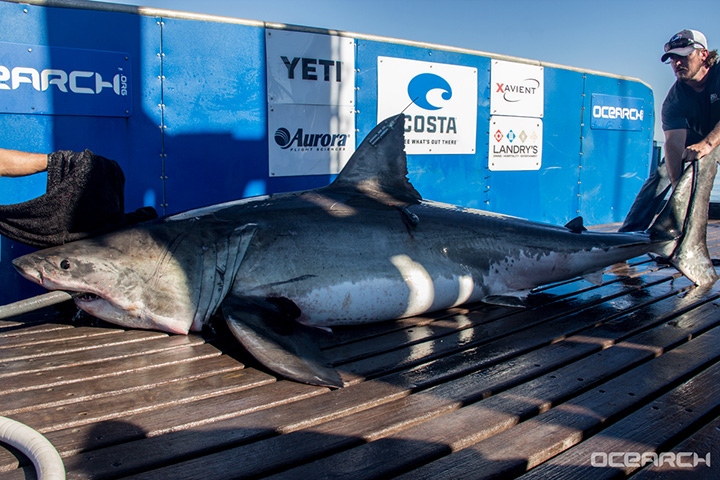Researchers are gonna need a bigger boat as they track a nearly 750-kilogram great white shark off the U.S. east coast.

The Virginian-Pilot reports that researchers located it early Monday in the Atlantic Ocean near the Virginia-North Carolina border.
The 756-kilogram, 3.6-metre young female great white shark was first tagged by OCEARCH researchers off the coast of Nantucket, Massachusetts, on Sept. 22.
Since then, the team at OCEARCH have named the shark Miss Costa, in honour of the non-profit organization’s partner Costa Sunglasses.
READ MORE: Great white shark seen cruising in Bay of Fundy near St. Andrews, N.B.
The shark is among hundreds being tracked via satellites by OCEARCH. Lead scientist Dr. Robert Hueter said the shark will help provide a better understanding of the life of a north Atlantic great white shark.
“This early success on Expedition Nantucket promises to be the opportunity we’ve needed to increase our sample sizes of Atlantic white sharks,” the scientist said in a statement. “Through real-time tracking of the sharks’ movements, long-term satellite and acoustic tracking, health assessments through blood, parasite and mucus sampling, and more, these vital studies will show us the threats that white sharks face and the places where we need to protect them.”
OCEARCH’s multi-year project uses GPS trackers affixed to the shark’s dorsal fin to post real time data of the hundreds of sharks the organization tracks.
READ MORE: Another large shark spotted in Maritime waters
Hueter explained to The Washington Post that he speculates that Miss Costa is heading south to Florida to feed in the winter.
“It’s not unusual for white sharks to come into the Carolina area close to the coast in winter time,” the scientist explained to the newspaper.
Great white sharks are the largest predatory fish in the world and, according to National Geographic; the fish can grow to an average of 4.6-metres, weighing in 2,268-kilograms or more.
The research organization posts the real time data online, showing where sharks last GPS “ping” was.
“Everyone will be able to follow along with Miss Costa as we watch and study her migratory patterns,” Al Perkinson, Vice President of Marketing for Costa said in a statement. “It’s this kind of scientific data that will help us collectively make more informed decisions about how to protect this incredible species. Safe travels, Miss Costa.”
–with a file from the Associated Press






Comments